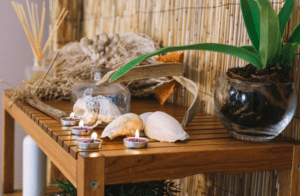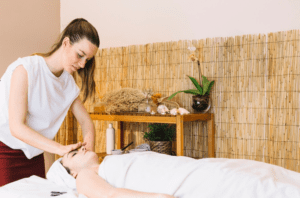Our world is busy and full of demands, so making time for good sleep often feels like a treat instead of something that needs to be done. But getting enough good rest is directly linked to our physical health, mental health, and general productivity. This means getting a good night’s sleep is necessary for best performance.
Unfortunately, many of us have trouble getting the restful sleep we need to do our best. People who have trouble sleeping have a much harder time with their daily lives. We can set a regular sleep plan to improve our sleeping habits and opt for a massage for sleep.
Make a relaxing bedtime routine and ensure our sleeping setting is as comfortable as possible. We will discuss helpful tips for getting a good night’s sleep when you feel sleepy after a massage.
Massage For Sleep: How It Can Help
- Set up a regular sleep schedule.
When it comes to getting good sleep, consistency is critical. Setting the same time to go to bed and wake up every day, even on the weekends, will teach your body’s internal clock when to sleep and wake up. This will make it easier to fall asleep and make you more likely to feel refreshed when you wake up. Even when you want to stay up late or sleep in, stick to your routine as much as possible.
- Set up a soothing bedtime routine.
Your bedtime routine tells your body it’s time to relax and prepare for a good night’s sleep. Before bed, make a relaxing routine that helps you wind down. For example, read a book, take a warm bath, do gentle yoga or stretching, or listen to soothing music. Anything that helps you relax is excellent but stay away from stimulating activities or screens because they could make it harder to get into sleep mode.
- Massage for sleep.
A massage for sleep in the evening can help you fall asleep and stay asleep. This type of tactile therapy is excellent for areas like the neck, shoulders, and back that tend to hold tension. Lavender or chamomile essential oils may help with relaxation even more, and an independent practitioner can do it. A bedtime massage can help you relax and prepare for a good night’s sleep.
- Improve the place where you sleep.
The setting in your bedroom is essential for getting a good night’s sleep. Create a calm, dark, and quiet oasis-like space. Buy comfortable mattresses and pillows that provide enough support. Block out the light with blackout curtains or eye masks. Use a white noise machine or earplugs to block out annoying noises if necessary. Keep the space as clutter-free as possible for the most relaxing atmosphere. All of these things can help you fall asleep quickly and soundly.
- Get rid of any stimulants from your diet.
Be careful about what you eat before bed, especially in the hours before. To sleep better, try to limit your intake of heavy, hot foods, coffee, and alcohol. These things can make it harder to fall asleep and stay asleep. If you’re hungry before bed, choose light snacks that are easy to digest. Also, drinking booze or smoking could keep you from getting a good night’s sleep.
- No more naps.
Short naps might be good for you, but prolonged or unpredictable naps during the day might make it hard to fall asleep at night. If you need a nap during the day, try to take a 20- to 30-minute nap no later than noon. This way, you won’t mess up your sleep-wake cycle and can use your nap to compensate for lost good sleep. You shouldn’t count on naps to make up for lost sleep if you are sleepy during the day because of insufficient sleep habits or an underlying problem. Instead, it would help if you looked for other ways to get the rest you need.
- Do not drink alcohol before bed.
While alcohol can make you sleepy for a short time, drinking in the hours before bed can mess up your regular sleeping routine and make you restless and confused. Don’t drink as much alcohol during this time to get better sleep naturally instead of using alcohol as a sleep aid. Create better sleeping habits and learn how to relax instead to get a better night’s sleep.
- Power of bright light.
Basking in natural sunlight or investing in bright light therapy devices can work wonders for those struggling with sleep disturbances. Research has demonstrated that consistent exposure to bright light during the day can significantly improve sleep quality and duration, reducing the time it takes to fall asleep by a remarkable 83% in individuals with insomnia.
- Digital detox in the evening.
In our technology-driven era, it’s crucial to establish boundaries with our electronic devices. The blue light emitted by smartphones, computers, and televisions can disrupt our circadian rhythms, tricking our brains into thinking it’s still daytime. To counteract this, consider implementing strategies like wearing blue light-blocking glasses, installing blue light-filtering apps, or simply unplugging from screens a couple of hours before bedtime.
- Mastering the art of tranquility.
External noise, whether from traffic or other sources, can significantly disrupt our sleep patterns and contribute to long-term health issues. To minimize external disturbances, prioritize investing in soundproofing measures or using white noise machines to create a serene, peaceful atmosphere.
- The comfort of darkness.
Light pollution can be a formidable foe when it comes to achieving restorative sleep. Ensure your bedroom is a haven of darkness by installing blackout curtains or using eye masks to block out any unwanted illumination.
- A cozy oasis.
The temperature of our sleeping quarters can profoundly influence our ability to fall and stay asleep. While individual preferences vary, research suggests that a cool, comfortable temperature around 20°C (68°F) is ideal for most individuals. Experiment with adjusting your thermostat or using fans or air conditioning units to find the perfect balance.
- Mindful practices
Participate in activities that encourage mindfulness and relaxation, like deep breathing exercises, meditation, or gentle yoga. These practices can calm the mind, relieve physical tension, and foster a sense of peace, helping to prepare for a restful sleep.
- Indulging in soothing sensations.
Explore the soothing properties of aromatherapy by incorporating calming scents like lavender or chamomile into your bedtime routine. Alternatively, treat yourself to a warm bath or foot soak, allowing the gentle warmth to melt away the stresses of the day and prepare you for a restful night’s sleep.
- Cultivating a supportive sleep environment.
Invest in a high-quality mattress and bedding that caters to your unique needs and preferences. A supportive sleeping surface can alleviate discomfort, reduce pain, and promote better spinal alignment, ultimately contributing to a more restful night’s sleep.
- Nurturing a wind-down ritual.
Develop a calming pre-bedtime routine that signals to your body and mind that it’s time to transition into a restful state. This could include activities like reading a book, practicing light stretches, or engaging in gentle meditation or deep breathing exercises.
- The melatonin advantage.
Melatonin, a hormone that our bodies naturally produce, is essential for managing our sleep-wake cycles. If you’re looking for a mild aid to help you sleep, melatonin supplements can be a safe and effective choice. It’s important to consult with a healthcare professional to find the right dosage and timing that suits your specific needs.
- Exploring the botanical world.
Nature’s bounty offers a wealth of plant-based remedies that have been used for centuries to promote relaxation and restful sleep. Consider incorporating soothing herbs like valerian root, chamomile, or passionflower into your routine through teas, tinctures, or supplements.
- Mindful nutrition for restful slumber.
The food you eat can greatly affect how well you sleep. Choose a balanced diet with lots of whole, nutrient-rich foods, and try to avoid stimulants like caffeine, especially later in the day.
- The benefits of physical activity.
Regular exercise can help you sleep better and fall asleep faster. But be careful with the timing; intense exercise right before bed can keep you awake.
- Managing stress
Ongoing stress and anxiety can make it hard to get good sleep. Focus on self-care activities like journaling, mindfulness, or getting professional help to improve your mental health and sleep.
Bottom line
By incorporating massage for sleep into our daily activities, we can make our homes a better place for restful, healing sleep. We are putting a regular sleep plan first, making bedtime practices more relaxing. Remember that getting better sleep is a path that takes time to find what works for you. Be patient with yourself as you try to get better sleep, and be determined but aware as you try to change your habits to enjoy all the benefits.
Book your massage for sleep appointment today at Spa Utopia!
FAQs
1. Why are regular sleep schedules important?
A good sleep routine regulates your circadian cycle. With consistent nighttime and morning wake-up times, your body will learn when and how to go to sleep and wake up refreshed. Staying up late or sleeping later on weekends might disturb this pattern, resulting in worse sleep.
2. Can I create a fun bedtime routine?
A good nighttime routine signals your body to relax and sleep. Before bed, read a book, take a warm bath, practice deep breathing or meditation, or listen to relaxing music. Your perfect routine relies on personal preference and lifestyle. Avoid stimulating activities or screens that might interrupt sleep.
3. How can I improve sleep?
Quality sleep requires a peaceful atmosphere. Create an ideal sleeping environment in your bedroom by using cool temperatures, dark lighting, quiet noise levels, comfortable bedding with supportive pillows, and blackout curtains or white noise machines to block outside distractions. Keeping electronics out of the bedroom promotes relaxation and reduces sleep interruptions.
4. How does exercise impact sleep?
Regular exercise relieves tension and fatigues the body, aiding sleep. Most days should include 30 minutes of moderate exercise, but avoid strenuous activity close to bedtime since it may energize you and make falling asleep harder. Discover hobbies you may add to your everyday routine to improve sleep and well-being.





